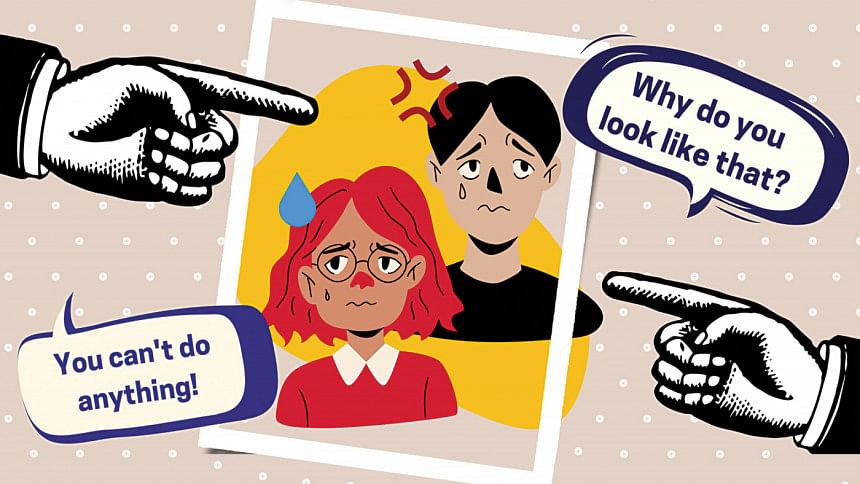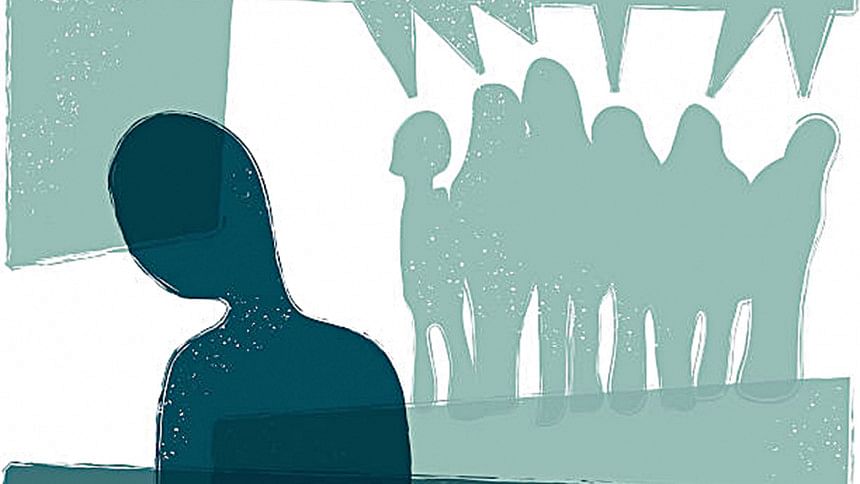The Aftermath of Getting Bullied

"I was bullied both verbally and physically when I moved to London in my early teens. As the new foreign kid, my peers often made racist remarks and made fun of my appearance. I later resorted to picking on other people as I couldn't retaliate against my own bullies. However, being physically violent brought me no joy, and I soon realised that I was stuck in a cycle," shares Farhan Rahman, a clinical analyst at Renata Limited, who turned his experience into an opportunity to grow as a person.
Many of us have faced some form of bullying at school, university, workplace or at home. These experiences not only take a toll on the victims, but even when the bullying finally stops, its after-effects may linger for years to come.
"As someone who has dealt with anger issues for most of their life, it taught me the need to control my temper," he adds. Upon being asked about the consequences of being bullied on his self-esteem, he says, "Insecurities that stemmed from being made fun of for my appearance have largely been resolved, but still resurface now and then."
According to Dr. Most. Aeysha Sultana, Associate Professor at the Department of Psychology, University of Dhaka, most Bangladeshis don't have proper awareness about bullying.
"They tend to think that it is synonymous with fighting, which is incorrect. Both physical and verbal bullying can cause long-term psychological damage to the victims. It can develop low self-esteem or lead to students avoiding school in fear of getting bullied. Victims may later go on to become bullies themselves out of frustration from constantly getting picked on. This phenomenon is called displacement," she states.

Although some people are able to largely reverse the consequences of being bullied, others may struggle to do well in their adulthood.
Twenty-five year old Emad Chowdhury, a fourth year student at North South University, says, "The impact of bullying is long lasting. Even today, I hesitate to stand up for myself because a voice inside my head tells me that confrontation may lead to me getting ridiculed. I've noticed that I've become more of an introvert after my experiences with getting bullied."
Emad also believes it had more serious consequences. "It has also played a part in me developing social anxiety and overall lower confidence," he reckons.
Bullying is commonly associated with educational institutions and is mainly expected to occur between peers. However, the possible perpetrators could be anybody, even teachers. The line between a strict teacher and an unkind teacher is often blurry. This may lead to students having to endure unnecessarily harsh treatment in the name of being disciplined.
Fatima Tasnim*, a 20 year old student at UCLA, shares her experience with a school teacher who asked her to stay back after class to talk because she was late that day.
"She outright said that I would never get into a good university after graduation, wouldn't get anywhere without the help of my parents, wouldn't get married and would be alone while all my friends would leave," recalls Fatima.
"Overall, I wouldn't say it affected me a lot because I had a great support system," she mentions.
I, too, was faced with a similar situation when I was assigned classes with a professor that bullied students and used inappropriate language in class. I later found out that he has a reputation for behaving this way, but seemed to have never faced any consequences. His behaviour was so discouraging that I contemplated changing my major as his disparaging words created doubt in my mind.
The lack of consequences for such behaviour reminded me of the bitter truth that many people in positions of power know they can get away with bullying people, which is why they confidently continue to do so.
Furthermore, contrary to popular belief, bullying can also take place at home. Family members often comment on people's appearance, whether positive or negative. When it comes to negative comments, what seem to be "friendly" jabs, can often become the source of long-lasting insecurities for many.
Sara Jamal, 23, says, "I used to be fat-shamed by my relatives every time I visited them. I was young and didn't appreciate their comments. I then resorted to dieting before meeting them, but that never worked because I couldn't keep up with it. Today, I'm always insecure about how I look, whether it be chubby or thin."
In some cases, the consequences of enduring bullying over a long period of time can be severe and irreversible.
"My brother was bullied by his classmates for various reasons, but mainly for his skin tone. Even our extended family members didn't spare him in this regard. This went on for a long time and its effects permeated into our home when he started taking out his frustrations on us. He went on to become very emotionally volatile due to all this. What people targeted him for might be specific, but on the inside, it affected him in far reaching ways," says Akib Ehsan*.
Although some people are able to dodge or reverse the consequences of getting bullied, many understandably struggle to do so. The experiences of everybody mentioned in this article are testaments to the fact that our words and actions hold a lot of weight, so much so that it may impact somebody else's life in ways we never anticipated.
It is imperative to not only discourage bullying, but also recognise that it can occur in any place, and not just in schools.
*Names have been changed to protect the privacy of individuals.
Nuzhat has messed up her sleeping schedule once again. Tell her to go to sleep at [email protected]

 For all latest news, follow The Daily Star's Google News channel.
For all latest news, follow The Daily Star's Google News channel. 



Comments